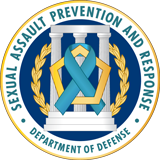The SAPR program addresses the criminal offenses of rape, sexual assault, aggravated sexual contact, abusive sexual contact, and non-consensual sodomy; these offenses may be found in UCMJ Articles 120, and attempts in Article 80. A concise training definition for sexual assault is found in DoD Directive 6495.01. There is also a stand-alone punitive article for retaliation in Article 132.
The following military rules of evidence impact privileged communication with Victim Advocates and psychotherapists.
- Military Rule of Evidence (MRE) 513 Text - Psychotherapist-Patient Privilege
- MRE 514 Text - Victim Advocate-Victim Privilege
- Complete Manual for Courts-Martial United States (2019 Edition)
Exclusions to SAPR areas of responsibility include:
- Intimate partner sexual assaults and child sexual assaults are handled by the DoD Family Advocacy Program (FAP).
- The SAPR program does not address sexual harassment, which is handled by the Office for Civil Rights and Equal Opportunity Policy.
- Military Sexual Trauma (MST), which is a term that encompasses trauma from both sexual assault and sexual harassment, is terminology used by the Department of Veterans Affairs to assess healthcare needs and disability claims. Sexual assault victims may be eligible for Department of Veterans Affairs services related to sexual trauma. Information for these services is available at: Department of Veteran Affairs MST Overview.
